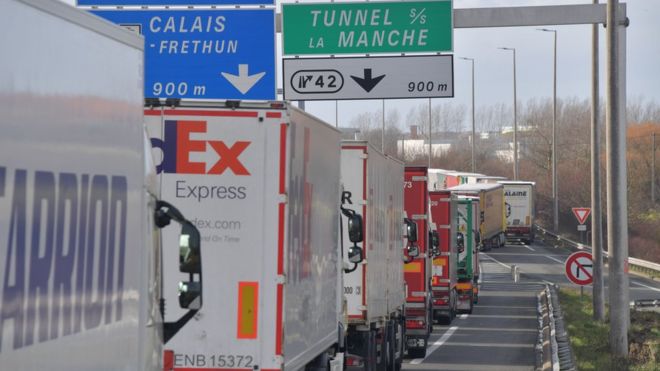
Traffic jams built up on Tuesday around the French port of Calais as customs officers worked to rule, carrying out tighter checks on lorries heading for the Channel Tunnel and the ferry port.
The action, which began on Monday, is aimed at improving pay and staff numbers ahead of the UK’s expected departure from the EU on 29 March.
Dunkirk, further up the French coast, is also affected.
“Brexit is a catalyst for deeper anger,” said one union official.
The A16 motorway near Calais became snarled up early on Tuesday. The biggest queues were close to the ferry port as well as the Channel Tunnel exit, and freight companies warned of long waits at border checkpoints.
For a second day, tailbacks of lorries stretched for several kilometres but ordinary traffic was still able to move.
Drone footage from one TV reporter showed the extent of the queues near the Channel Tunnel.
Drivers hooted in frustration and Calais officials set up holding areas to deal with the weight of traffic.
The local prefect banned until Wednesday lorries weighing more than 7.5 tonnes from taking the westbound motorway route from near Dunkirk to the tunnel.
Waiting times at Dunkirk port were more than two hours and every lorry was still being checked, ferry operator DFDS operator said.
While 100% border checks had stopped at Calais, it said waiting time there was “extensive”, with traffic being diverted through the town.
As lorries came to a standstill there were reports that migrants had tried to board the vehicles to get across the Channel.
Union officials said their “unlimited” action was aimed at “showing what will happen with Brexit”, when the UK leaves the European Union.
The possibility of a no-deal Brexit has led to fears of major disruption on both sides of the Channel.
The French government has announced plans to increase the number of customs officers in response to Brexit. The 300 deployed at the Channel Tunnel will be increased to 365 while the 64 at Calais port will almost double.
But union officials say they want bigger numbers recruited because of Brexit, as well as better night pay and danger money.
“If the UK becomes a third country, checks will become more in-depth. This is the first, full demonstration of what will happen,” said CGT union official Philippe Bollengier.
The head of French customs, Rodolphe Gintz, said he was astonished by the “work-to-rule strike”, which he was adamant had nothing to do with Brexit. “They’re targeting lorries that are leaving for the UK even though it’s the country of destination that carries out the checks.”
Budget minister Gérald Darmanin said France was prepared and he insisted there would not be a “bottleneck of the century”.
The British government has also sought to allay fears, promising that lorries coming into the UK will be able to drive straight off ferries and Channel Tunnel trains by filling in a frontier declaration beforehand.
In January, UK officials staged an exercise involving a convoy of 89 lorries at a disused airport in Kent as part of its contingency plans.